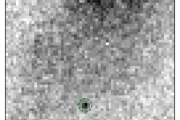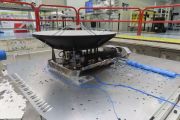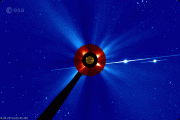
Copernical Team
PickNik Robotics wins Space Force contract for on-orbit capture
 PickNik Robotics has won a SpaceWERX contract to work on robotics for the US Space Force. In addition, the company recently won a NASA Small Business Innovation Research (SBIR) Phase I contract for continued work on supervised autonomy for space robotics, as well as a Colorado Advanced Industries Accelerator (AIA) grant for space robotics.
"These three wins provide additional validation of
PickNik Robotics has won a SpaceWERX contract to work on robotics for the US Space Force. In addition, the company recently won a NASA Small Business Innovation Research (SBIR) Phase I contract for continued work on supervised autonomy for space robotics, as well as a Colorado Advanced Industries Accelerator (AIA) grant for space robotics.
"These three wins provide additional validation of Airbus and Salam join forces for High Altitude Platform Station connectivity services
 Airbus' HAPS Connectivity Business has signed a strategic partnership with Salam, a leading Saudi telecommunications and ICT company and part of the Mawarid Media and Communications Group (MMCG), to progress the development of private networks, IoT applications, disaster management solutions and other connectivity and high-altitude Earth observation services from the stratosphere to serve the Ki
Airbus' HAPS Connectivity Business has signed a strategic partnership with Salam, a leading Saudi telecommunications and ICT company and part of the Mawarid Media and Communications Group (MMCG), to progress the development of private networks, IoT applications, disaster management solutions and other connectivity and high-altitude Earth observation services from the stratosphere to serve the Ki Spice innovation for Earth with the SeRANIS mission
 LuxSpace, a subsidiary of space and technology group OHB SE, and the University of German Armed Forces Munich just signed a contract for the dtec.bw SeRANIS (Seamless Radio Access Network for Internet of Space) small satellite mission.
This UniBw M mission provides the world's first publicly accessible multifunctional experimental laboratory in orbit and will use the LuxSpace built Triton-
LuxSpace, a subsidiary of space and technology group OHB SE, and the University of German Armed Forces Munich just signed a contract for the dtec.bw SeRANIS (Seamless Radio Access Network for Internet of Space) small satellite mission.
This UniBw M mission provides the world's first publicly accessible multifunctional experimental laboratory in orbit and will use the LuxSpace built Triton- Claro Brasil to Extend 4G and 5G-Ready Mobile Services Across Amazon Region with SES's O3b mPOWER
 With unprecedented demand for high-powered mobile connectivity in the most isolated communities of the Amazon, SES has signed a multiyear capacity renewal with Claro Brasil, through Embratel, its corporate solutions division, to enable the delivery of enhanced 4G/5G-ready services via its O3b mPOWER network, SES's next-gen medium earth orbit (MEO) communications system, in at least eight of 23 c
With unprecedented demand for high-powered mobile connectivity in the most isolated communities of the Amazon, SES has signed a multiyear capacity renewal with Claro Brasil, through Embratel, its corporate solutions division, to enable the delivery of enhanced 4G/5G-ready services via its O3b mPOWER network, SES's next-gen medium earth orbit (MEO) communications system, in at least eight of 23 c NASA inflatable heat shield finds strength in flexibility
 How does something that looks like a stack of orange inner tubes covered in a black tarp survive temperatures reaching 3,000 degrees Fahrenheit as it plunges through the atmosphere? An upcoming technology demonstration uses advanced materials to make a heat shield that's tougher than it looks.
Hypersonic Inflatable Aerodynamic Decelerator (HIAD) technology has been in development for more
How does something that looks like a stack of orange inner tubes covered in a black tarp survive temperatures reaching 3,000 degrees Fahrenheit as it plunges through the atmosphere? An upcoming technology demonstration uses advanced materials to make a heat shield that's tougher than it looks.
Hypersonic Inflatable Aerodynamic Decelerator (HIAD) technology has been in development for more UCF researcher receives NASA award to develop revolutionary rocket engine technology
 A University of Central Florida researcher has received NASA funding to further develop a novel rocket engine system that could revolutionize space travel.
The project focuses on rotating detonation rocket engines (RDREs), which are powered by continuous Mach 5 explosions that rotate around the inside of the engine and are sustained by hydrogen and oxygen propellants fed into the system in
A University of Central Florida researcher has received NASA funding to further develop a novel rocket engine system that could revolutionize space travel.
The project focuses on rotating detonation rocket engines (RDREs), which are powered by continuous Mach 5 explosions that rotate around the inside of the engine and are sustained by hydrogen and oxygen propellants fed into the system in D-Orbit signs launch contract with AAC SpaceQuest
 Space logistics and transportation company D-Orbit announced the signing of a launch contract with AAC SpaceQuest, the US subsidiary of AAC Clyde Space. SpaceQuest is a well-established satellite manufacturer and operator specialized in small satellite technologies and space data services.
The agreement covers the launch and deployment of an initial two satellites, based on SpaceQuest's ne
Space logistics and transportation company D-Orbit announced the signing of a launch contract with AAC SpaceQuest, the US subsidiary of AAC Clyde Space. SpaceQuest is a well-established satellite manufacturer and operator specialized in small satellite technologies and space data services.
The agreement covers the launch and deployment of an initial two satellites, based on SpaceQuest's ne ESA astronauts help map Europe’s light pollution from space

Discovery funding transforms ESA patents into commercial success

Whether sending European spacecraft to distant frontiers, studying our home planet in greater detail than ever before, or designing new launch systems, ESA activities drive the development of new technologies.
The Incredible Adventures of the Hera mission – Tales of Terrific Technology
 Video:
00:02:56
Video:
00:02:56
Meet Hera, our very own asteroid detective. Together with two CubeSats – Milani the rock decoder and Juventas the radar visionary – Hera is off on an adventure to explore Didymos, a double asteroid system that is typical of the thousands that pose an impact risk to planet Earth.
Suitable for kids and adults alike, this episode of ‘The Incredible Adventures of Hera’ details the miniaturised James-Bond-style technology that Hera and its CubeSats will carry aboard with them to explore their asteroid target.




































